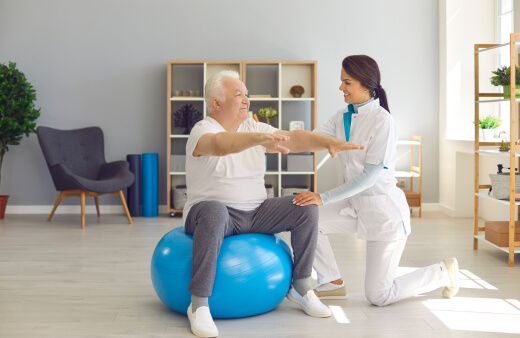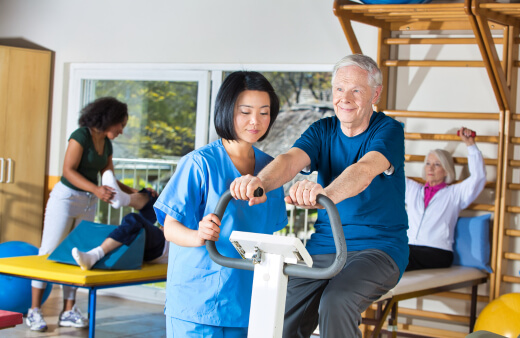Exercise plays a crucial role in enhancing the quality of life for the elderly. As we age, maintaining an active lifestyle becomes increasingly important for physical health, cognitive function, and emotional well-being.
In this article, we will explore the benefits of exercise for seniors and how exercise physiology, with its specialised knowledge and expertise, can support the health and well-being of the elderly population.
Join us as we delve into the significance of exercise physiology for the elderly and its impact on enhancing their quality of life.

The Importance of Exercise for the Elderly
Regular exercise offers numerous benefits for the elderly. It helps maintain healthy bones, muscles, and joints, improves cardiovascular health, enhances balance and flexibility, and supports cognitive function.
Exercise also aids in managing chronic conditions, reducing the risk of falls and injuries, improving mood and mental well-being, and promoting overall independence and longevity. Exercise physiology interventions also contribute to weight management, boosting positive mood and mental well-being, and enhancing overall quality of life.
By engaging in exercise physiology programs, seniors can maintain independence, improve their ability to perform daily tasks, and enjoy an active and fulfilling lifestyle.
Exercise Physiology for the Elderly
Exercise physiologists specialise in developing personalised exercise programs for the elderly population. They understand the unique needs and limitations of seniors and design tailored exercise interventions to address those specific requirements.
With their expertise in exercise science and physiology, exercise physiologists create safe and effective programs that focus on improving mobility, strength, flexibility, and overall functional capacity.
By collaborating with exercise physiologists, seniors can experience the benefits of exercise in a structured and supportive manner.
Designing Personalised Exercise Programs for Seniors
Exercise physiologists work closely with seniors to develop personalised exercise programs that meet their individual needs and goals. These programs consider factors such as overall health, fitness level, medical history, and specific physical limitations.
Exercise physiologists incorporate a combination of aerobic exercises, strength training, balance and flexibility exercises, and functional movements tailored to the abilities and preferences of each senior.
The exercise programs are progressive and adaptable, ensuring that seniors can safely and effectively improve their physical fitness and well-being.

The Role of Exercise Physiologists in Enhancing Quality of Life for the Elderly
Exercise physiologists play a vital role in supporting the health and well-being of the elderly population. They provide guidance, education, and support to seniors, empowering them to adopt and maintain an active lifestyle.
Exercise physiologists create a safe and inclusive exercise environment, monitor progress, make necessary adjustments to the exercise programs, and provide motivation and accountability.
By working with exercise physiologists, seniors can benefit from their specialised knowledge and experience, ensuring that their exercise programs are tailored to their specific needs, abilities, and goals.
Example of How an Exercise Physiologist Can Help Improve the Lifestyle of a Senior
Let’s consider the example of Susan, a senior who is experiencing mobility challenges and wants to improve her overall quality of life. Susan seeks the assistance of an exercise physiologist to help her on her journey towards better health and well-being.
Conducting an Assessment
Upon their initial meeting, the exercise physiologist conducts a thorough assessment of Susan’s current fitness level, medical history, and specific goals. They discuss Susan’s mobility challenges and her desire to regain independence in daily activities such as walking, climbing stairs, and performing household tasks.
Designing a Personalised Exercise Program
Based on the assessment, the exercise physiologist designs a personalised exercise program for Susan. The program includes a combination of exercises to improve her strength, flexibility, balance, and cardiovascular fitness.
For strength training, the exercise physiologist incorporates resistance exercises using resistance bands and light weights to target specific muscle groups. They also include functional movements that mimic daily activities, such as squatting, bending, and reaching, to enhance Susan’s ability to perform these tasks with ease.
To improve flexibility and joint mobility, the exercise physiologist includes gentle stretching exercises and range-of-motion movements. These exercises help Susan maintain or improve her range of motion, making it easier for her to perform activities like reaching overhead or bending down to pick up objects.
In addition, the exercise physiologist includes balance exercises in Susan’s program to reduce the risk of falls and improve her stability. These exercises may involve standing on one leg, walking heel-to-toe, or practising tai chi movements. By improving her balance, Susan gains confidence in her ability to navigate her surroundings safely.
Monitoring of Progress
Throughout the process, the exercise physiologist closely monitors Susan’s progress and adjusts the exercise program as needed. They provide guidance on proper technique and form to ensure Susan’s safety and optimise the effectiveness of her workouts.
Over time, Susan starts noticing significant improvements in her overall well-being. Her strength and endurance increase, making daily activities easier and less tiring. She gains confidence in her balance and stability, reducing her fear of falling.
Susan also experiences enhanced flexibility, allowing her to move with greater ease and comfort. Moreover, regular exercise positively impacts her mood, energy levels, and overall sense of well-being.
With the support of the exercise physiologist, Susan not only achieves her goal of regaining independence in daily activities but also gains a renewed sense of vitality and joy in her life. The exercise program tailored to her needs and abilities allows her to enjoy an active lifestyle, engage with friends and family, and live life to the fullest.
Find Out More About Exercise Physiology for the Elderly
Exercise physiology plays a crucial role in enhancing the quality of life for the elderly. With personalised exercise programs developed by exercise physiologists, seniors can experience improved physical fitness, cognitive function, emotional well-being, and overall independence.
If you’re a senior looking to enhance your quality of life through exercise, consider the support of exercise physiologists who can guide you on your journey towards a healthier and more fulfilling life.
Experience the benefits of exercise physiology for the elderly. Contact SSEP today to consult with our experienced exercise physiologists and take the first step towards improving your quality of life through exercise.
